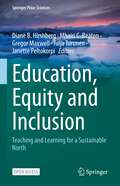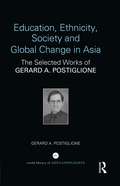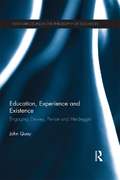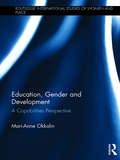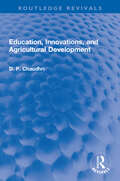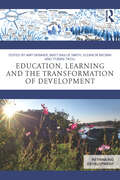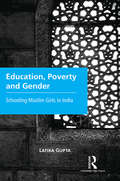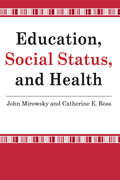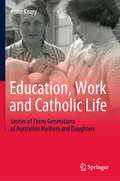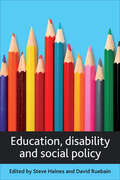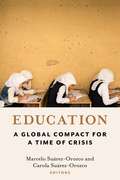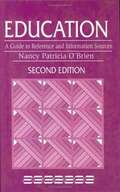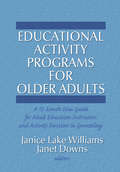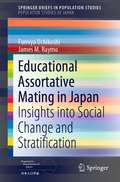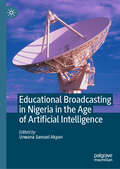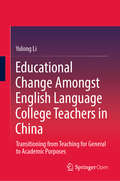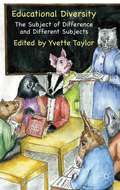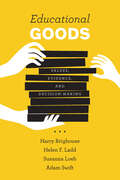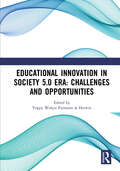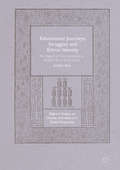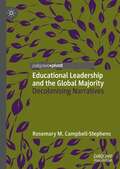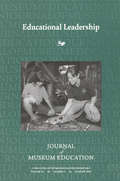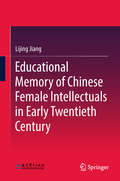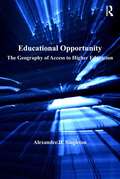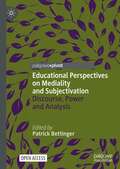- Table View
- List View
Education, Equity and Inclusion: Teaching and Learning for a Sustainable North (Springer Polar Sciences)
by Mhairi C. Beaton Diane B. Hirshberg Gregor Maxwell Tuija Turunen Janette PeltokorpiThis open access book provides a current view on education, equity and inclusion within the lens of education for a sustainable North. The first book published by the University of the Arctic Thematic Network for Teacher Education for Social Justice and Diversity (Including the North: A comparative study of the policies on inclusion and equity in the circumpolar North, 2019) highlighted policies of inclusion and equity in education in national and regional contexts. This new book explores in more depth the provision of education across the north, focusing on challenges and innovations in meeting the needs of diverse learners in remote and rapidly changing contexts.While many texts address issues of equity, inclusion and diversity, they are almost all focused on the global South, and miss the lessons that can be learned from Northern regions. This book offers an extended essay on teaching and learning through various perspectives and experiences with the aim of creating a more sustainable North. It is structured around two main themes: 1) Supporting Teachers for Diversity and Inclusion in the Classroom including consideration of language and identity issues, 2) Engendering community solutions to structural and geographical challenges in education in the circumpolar north.
Education, Ethnicity, Society and Global Change in Asia: The Selected Works of Gerard A. Postiglione
by Gerard A. PostiglioneIn the World Library of Educationalists series, international experts compile career-long collections of what they judge to be their finest pieces – extracts from books, key articles, salient research findings, major theoretical and practical contributions – so the world can read them in a single manageable volume. Readers will be able to follow the themes and strands and see how their work contributes to the development of the field. For more than three decades, Gerard A. Postiglione has witnessed first-hand the globalization of education and society in Hong Kong, China and the wider Asian region. He is a pioneer among Western scholars in the field and his fluency in Chinese has resulted in innovative primary research and fieldwork. He has brought sociological, policy, and comparative perspectives to important educational issues in Asia. His research emphasizes the diversity and complexity of the region, from studies of education and the academic profession during Hong Kong’s retrocession, to reform of ethnic minority education and the rise of world class universities in the Chinese mainland, as well as the complexity of mass higher education in an increasingly dynamic Asia. He is one of the researchers most sought-after by international organizations concerned with educational reform in Asia and by major media outlets to inform the public on issues of globalization and higher education. Gerard was honoured by the Comparative and International Education Society with a Lifetime Contribution Award and Best Book Award for his contribution to the field. In 2016 he was inducted as a Fellow of the American Educational Research Association. This selection of 12 of his most representative papers and chapters documents his scholarship in comparative higher education in Asia.
Education, Experience and Existence: Engaging Dewey, Peirce and Heidegger (New Directions in the Philosophy of Education)
by John QuayEducation, Experience and Existence proposes a new way of understanding education that delves beneath the conflict, confusion and compromise that characterize its long history. At the heart of this new understanding is what John Dewey strove to expound: a coherent theory of experience. Dewey’s reputation as a pragmatist is well known, but where experience is concerned pragmatism is only half the story. The other half is phenomenological, as crafted by Martin Heidegger. Encompassing both is Charles Sanders Peirce, whose philosophy draws pragmatism and phenomenology together in an embrace which enables a truly experiential philosophy to emerge. The book approaches the problem of confusion in education and philosophy by beginning with our most basic understandings of existence. Existence as an interaction is the starting point of modern science, and existence as individuality offers an aesthetic origin, attending to existence as a simple unity. In our contemporary world where scientific ways of thinking are privileged, the aesthetic whole is often overlooked, especially in education. Yet both are connected. A coherent theory of experience is therefore a marriage between phenomenology and pragmatism, enabling each to maintain its position by acknowledging how both are required. The book is divided into three main parts: - confusion in philosophy and education- a coherent theory of experience- a coherent theory of education. Quay suggests that education benefits from such a coherent theory of experience by better comprehending its connection to life. More than just knowing, more than just doing, education is about being. This book will be of interest to philosophers, educators and educational philosophers.
Education, Gender and Development: A Capabilities Perspective (Routledge International Studies of Women and Place)
by Mari-Anne OkkolinThis compelling book takes a novel approach to the complexities of girls’ and women’s education in the global South. To unravel the critical issues and processes behind educational advancement and to identify the factors that support the construction of educational well-being and agency from gender perspective, the book narrates the stories of women who have successfully built their educational careers to higher education. The book creatively applies the human development and capabilities approach to analyze and assess educational advancement and development. Mari-Anne Okkolin offers a fresh voice to the field of education, gender and development. The book draws on rich, in-depth evidence from Tanzanian women who have reached higher education, placing them amongst the very small percentage of women in the Tanzanian and sub-Saharan contexts. The book explores the women’s school experiences, everyday life practices and familial arrangements, and the values, expectations and assumptions associated with education and the schooling of girls and women. Due to the multi-disciplinary nature of the book, it will be of great interest to multiple academic audiences: post-graduates, researchers and academics. It is of particular relevance for all those interested in education, sociology, development studies, gender/women’s studies, and qualitative research methodology. The book will appeal especially to scholars working with the capabilities approach. It will also be of value beyond academia, for education practitioners in planning and implementing education and equality policies internationally.
Education, Innovations, and Agricultural Development: A Study of North India (1961-72) (Routledge Revivals)
by D. P. ChaudhriFirst published in 1979, Education, Innovations, and Agricultural Development investigates the effect of education on agricultural productivity and innovations that took place in the wake of the Green Revolution in North India, using a simultaneous equations model. The Green Revolution of the 1960s, with its twin aims of raising production and improving the quality of input, was expected to induce a majority of farming families to respond to policies and programmes devised for bringing about development in agricultural sectors. Focusing on the wheat-growing areas of Punjab and Haryana, where high yielding varieties of seed have been introduced extensively, it shows that general education up to secondary level has a significant impact on the diffusion of technology and agricultural productivity and that higher production in turn increases the demand for education. This book deserves to be read by all concerned with development in Asian countries; agriculture; developmental economics; and educationists.
Education, Learning and the Transformation of Development (Rethinking Development)
by Amy Skinner, Matt Baillie Smith, Eleanor Brown and Tobias TrollWhilst education has been widely recognised as a key tool for development, this has tended to be limited to the incremental changes that education can bring about within a given development paradigm, as opposed to its role in challenging dominant conceptions and practices of development and creating alternatives. Through a collection of insightful and provocative chapters, this book will examine the role of learning in shaping new discourses and practices of development. By drawing on contributions from activists, researchers, education and development practitioners from around the world, this book situates learning within the wider political and cultural economies of development. It critically explores if and how learning can shape processes of societal transformation, and consequently a new language and practice of development. This includes offering critical accounts of popular, informal and non-formal learning processes, as well as the contribution of indigenous knowledges, in providing spaces for the co-production of knowledge, thinking and action on development, and in terms of shaping the ways in which citizens engage with and create new understandings of ‘development’ itself. This book makes an important and original contribution by reframing educational practices and processes in relation to broader global struggles for justice, voice and development in a rapidly changing development landscape.
Education, Poverty and Gender: Schooling Muslim Girls in India
by Latika GuptaThis book investigates the nature of identity formation among economically backward adolescent Muslim girls in northern India by focusing on the interstitial spaces of the ‘home’ and ‘school’. It examines issues of religion, patriarchy and education, to interrogate the relationship between pedagogy and religion in South Asia. Using a multi-disciplinary approach and multiple research methods, the volume makes significant contribution to the study of socialisation and modern education among minorities and other marginalised groups in India. It will be of interest to scholars of education, culture and gender studies, sociology, psychology, Islamic studies, and to policy-makers and non-government organisations involved in education.
Education, Social Status, and Health (Social Institutions And Social Change Ser.)
by John MirowskyEducation forms a unique dimension of social status, with qualities that make it especially important to health. It influences health in ways that are varied, present at all stages of adult life, cumulative, self-amplifying, and uniformly positive. Educational attainment marks social status at the beginning of adulthood, functioning as the main bridge between the status of one generation and the next, and also as the main avenue of upward mobility. It precedes the other acquired social statuses and substantially influences them, including occupational status, earnings, and personal and household income and wealth. Education creates desirable outcomes because it trains individuals to acquire, evaluate, and use information. It teaches individuals to tap the power of knowledge. Education develops the learned effectiveness that enables self-direction toward any and all values sought, including health.For decades American health sciences has acted as if social status had little bearing on health. The ascendance of clinical medicine within a culture of individualism probably accounts for that omission. But research on chronic diseases over the last half of the twentieth century forced science to think differently about the causes of disease. Despite the institutional and cultural forces focusing medical research on distinctive proximate causes of specific diseases, researchers were forced to look over their shoulders, back toward more distant causes of many diseases. Some fully turned their orientation toward the social status of health, looking for the origins of that cascade of disease and disability flowing daily through clinics.Why is it that people with higher socioeconomic status have better health than lower status individuals? The authors, who are well recognized for their strength in survey research on a broad national scale, draw on findings and ideas from many sciences, including demography, economics, social psychology, and the health sciences. People who are well educated feel in control of their lives, which encourages and enables a healthy lifestyle. In addition, learned effectiveness, a practical end of that education, enables them to find work that is autonomous and creative, thereby promoting good health.
Education, Work and Catholic Life: Stories of Three Generations of Australian Mothers and Daughters
by Anne KearyThis book reports on innovative interdisciplinary research in the field of cultural studies. The study spans the early twentieth to twenty-first centuries and fills a gap in our understanding of how girls’ and women’s religious identity is shaped by maternal and institutional relations. The unique research focuses on the stories of thirteen groups of Australian mothers and daughters, including the maternal genealogy of the editor of the book. Extended conversations conducted twenty years apart provide a situated approach to locating the everyday practices of women, while the oral storytelling presents a rich portrayal of how these girls and women view themselves and their relationship as mothers and daughters. The book introduces the key themes of education, work and life transitions as they intersect with generational change and continuity, gender and religion, and the non-linear transitional stories are told across the life-course examining how Catholic pasts shaped, and continue to shape, the participants’ lives. Adopting a multi-methodological approach to research drawing on photographs, memorabilia passed among mothers and daughters, journal entries and letters, it describes how women’s lives are lived in different spaces and negotiated through diverse material and symbolic dimensions.
Education, disability and social policy
by David Ruebain and Steve HainesDisability is an increasingly vital contemporary issue in British social policy especially in education. Education, disability and social policy brings together for the first time unique perspectives from leading thinkers including senior academics, opinion formers, policy makers and school leaders. Key issues covered include: law and international human rights frameworks; policy developments for schools and school leaders; educational inequalities for disabled children and young people and curriculum design and qualifications changes for children who are being failed by the current education system. The book is a milestone in social policy studies, of enduring interest to students, academics, policy makers, parents and campaigners alike.
Education: A Global Compact for a Time of Crisis
by Suárez-Orozco, Marcelo; Suárez-Orozco, CarolaIn an age of catastrophes—unchecked climate change, extreme poverty, forced migrations, war, and terror, all compounded by the COVID-19 pandemic—how can schooling be reengineered and education reimagined? This book calls for a new global approach to education that responds to these overlapping crises in order to enrich and enhance the lives of children everywhere.Marcelo Suárez-Orozco and Carola Suárez-Orozco convene scholars and practitioners from a range of disciplines—including anthropology, neuroscience, demography, psychology, child development, sociology, and economics—who offer incisive essays on the global state of education. Contributors consider how educational policy and practice can foster social inclusion and improve outcomes for all children. They emphasize the centrality of education to social and environmental justice, as well as the philosophical foundations of education and its centrality to human flourishing, personal dignity, and sustainable development. Chapters examine topics such as the neuroscience of education; the uses of technology to engage children who are not reached by traditional schooling; education for climate change; the education of immigrants, refugees, and the forcibly displaced; and how to address and mitigate the effects of inequality and xenophobia in the classroom. Global and interdisciplinary, Education speaks directly to urgent contemporary challenges.Contributors include Stefania Giannini, the director of education for UNESCO; development economist Jeffrey Sachs; cognitive psychologist Howard Gardner; Carla Rinaldi, president of the Reggio Children Foundation; and academics from leading global universities. The book features a foreword by Pope Francis.
Education: A Guide to Reference and Information Sources (2nd edition)
by Nancy Patricia O'BrienFocusing on English-language publications of the last decade, this guide identifies and describes key reference and information sources in the field of education today.
Educational Activity Programs for Older Adults: A 12-Month Idea Guide for Adult Education Instructors and Activity Directors in Gerontology
by Janice Williams Janet C DownsIf you have ever found yourself frustrated by the lack of printed materials for ideas to be used in conducting classes or activities with older adults, look no more! Educational Activity Programs for Older Adults is an innovative guide for planning programs that meet the social, recreational, rehabilitative, and educational needs of older adults.This valuable resource includes detailed instructions for two activity programs and a list of events for each month of the year. Particular emphasis is placed on holidays and the events surrounding them, with every possible detail provided--history and culture, program overview, preparation, arts and crafts activities, and music, food, and costume ideas. The resourceful and skilled authors have also included a list of topics for every day of the month, which the creative activity professional can use to plan additional activities or generate discussions.Use this practical volume to offer new, unique, and effective instructional programs for older adults. The variety of the activities illustrates the wide range of choices and the limitless creativity you can use in program planning. The focus is on the individual and what benefits him or her most. You will learn how to prepare for each project and how to teach it--with step-by-step descriptions. Educational Activity Programs for Older Adults is a comprehensive book that gives you a wealth of ideas for flexible and fun projects that will motivate and educate the older adults with whom you work.Highlights of this useful book . . . theories related to aging that provide general background knowledge two activity programs and list of events for each month of the year a list of monthly events that contains at least one topic for every day of the month educational, stimulating, and fun activities for program participants and their instructors complete details of activities that develop specific motor skills and cognitive functioning in older persons an overview of the background of each holiday, as well as a thorough explanation of how to implement the program flexible programs to meet the needs of older adults step-by-step instructions for planning and teaching each activity lists of convenient materials for each project ideas for arts and crafts activities, music, and food that are appropriate for each holiday celebration ideas for activities that encourage individual participation, enabling older adults to express their interests, talents, and areas of expertise
Educational Assortative Mating in Japan: Insights into Social Change and Stratification (SpringerBriefs in Population Studies)
by James M. Raymo Fumiya UchikoshiThis book represents a first attempt to comprehensively discuss and investigate causes and potential implications of changing patterns of spouse pairing in Japan and to consider similarities and differences with patterns observed in the USA and other low-fertility Western societies. In this book, research on educational assortative mating in Japan is summarized and updated. This book contributes to research on the demography of contemporary Japan by overviewing theoretical and empirical linkages between marriage behavior and processes of social and economic stratification. It also extends the large body of research on assortative mating and stratification by incorporating insights from the understudied context of Japan. The authors draw upon multiple data sources – both survey and administrative data – to update and extend previous research on “who marries whom” in Japan. The wide range of consequences considered includes income inequality, the intergenerational transmission of advantage and disadvantage, marriage and fertility timing, lifelong singlehood, childlessness, and the family roles of husbands and wives. Throughout the manuscript, Japan is considered in comparative perspective by employing the large USA and international literatures on assortative mating.
Educational Broadcasting in Nigeria in the Age of Artificial Intelligence
by Unwana Samuel AkpanThis book does two things, first it celebrates and honors the research, scholarship, and leadership of Comfort Memfin Ekpo, the renowned Nigerian professor of educational technology, who is the second female vice chancellor to head a federal university in Nigeria. This book also explores the profound impact of digital interruptions and disruptions in the broadcast sector in Nigeria, exacerbated by the advent of artificial intelligence (AI). The book underscores the inadequacy of existing discourse to encompass the transformation of traditional educational broadcasting and programming. With Nigeria grappling with the highest number of out-of-school children globally, the book explores the urgent need to re-evaluate educational programs in the digital age, targeting marginalized populations hindered by factors such as electricity shortages and insufficient resources. The book, comprising contributions from senior scholars across Nigeria, aims to dissect the challenges and opportunities presented by AI and digitization in reshaping educational broadcasting. Unprecedented in its interdisciplinary approach, the book explores the intersections of communication, media, education, government policies, and the globalized landscape, offering a comprehensive analysis of the evolving dynamics in the field.
Educational Change Amongst English Language College Teachers in China: Transitioning from Teaching for General to Academic Purposes (Springerbriefs In Education Ser.)
by Yulong LiThis open access book provides anthropological insights into the arduous yet rewarding journeys involved in selected TESOL teachers’ pedagogical transition to teaching English for Academic Purposes (EAP) at universities in Shanghai, the largest metropolitan area in China. Applying a unique combination of ethnography and phenomenology, the book offers innovative new perspectives on teacher education research. Drawing on the latest language education theory, it outlines a practitioner-friendly approach to EAP literacy. Teacher readers will especially benefit from the case studies presented here, which provide role models for teacher change in educational reform, as well as advice on their academic careers. In addition to addressing a timely and important research gap on EAP teachers in non-Western countries, the book is the ideal choice for readers interested in an update on English education in China.
Educational Diversity
by Yvette TaylorThis collection explores the relationship between new equality regimes and continued societal inequalities, exploring change, ambivalence and resistance specifically in relation to compulsory and post-compulsory education, seeking to more fully situate the educational journeys and experiences of staff and students.
Educational Goods: Values, Evidence, and Decision-Making
by Helen F. Ladd Adam Swift Harry Brighouse Susanna Loeb“An ambitious effort that succeeds in providing a fundamentally new way to talk about and . . . think about policy choices in education.” —Jeffrey R. Henig, Teachers College, Columbia UniversityWe spend a lot of time arguing about how schools might be improved. But we rarely take a step back to ask what we as a society should be looking for from education—what exactly should those who make decisions be trying to achieve?In Educational Goods, two philosophers and two social scientists address this very question. They begin by broadening the language for talking about educational policy: “educational goods” are the knowledge, skills, and attitudes that children develop for their own benefit and that of others; “childhood goods” are the valuable experiences and freedoms that make childhood a distinct phase of life. Balancing those, and understanding that not all of them can be measured through traditional methods, is a key first step. From there, they show how to think clearly about how those goods are distributed and propose a method for combining values and evidence to reach decisions. They conclude by showing the method in action, offering detailed accounts of how it might be applied in school finance, accountability, and choice. The result is a reimagining of our decision making about schools, one that will sharpen our thinking on familiar debates and push us toward better outcomes.“Every education decision-maker—and every education researcher—would benefit from reading this book.” —David N. Figlio, School of Education and Social Policy, Northwestern University“Imaginative, informative, and unfailingly constructive.” —Michael S. McPherson, co-author of Lesson Plan: An Agenda for Change in American Higher Education
Educational Innovation in Society 5.0 Era: Proceedings of the 4th International Conference on Current Issues in Education (ICCIE 2020), Yogyakarta, Indonesia, 3 - 4 October 2020
by Yoppy Wahyu PurnomoThis book consists of a selection of papers that discuss the challenges in the increasingly complex world of education and various educational problems such as moral degradation, lack of literacy, pedagogical curriculum and innovation, educational technology. Moreover, the book provides papers that deal with educational innovation in the era of Society 5.0, with a view to discuss and resolve various social challenges, issues, and problems relating to educators, students, the dynamics of the education system, and social dynamics. The subject areas treated in this book are: Character Education in Society 5.0 Era, Multiliteracy Education in Society 5.0 Era, Early Childhood Education in Society 5.0 Era, Inclusive Education in Society 5.0 Era, Curriculum, Media and Educational Technology for Primary Education in Society 5.0 Era, Joyful and Meaningful Learning in Society 5.0 Era, and HOTS in Society 5.0 Era. This book will help educators, stakeholders, and also parents to cope with the challenges in education.
Educational Journeys, Struggles and Ethnic Identity
by Xinyi WuThis book examines how state schooling in China has economically, culturally, and ideologically had an impact on and gradually transformed a traditional Muslim Hui village in rural Northwestern China. By discussing the interpretation and appropriation of dominant educational discourse of "quality" in the rural context, it illustrates the dichotomies of poverty and prosperity, civility and uncivility, and religiosity and secularity as they are perceived and understood by teachers, parents and students. Based on an original ethnographic research conducted in a secondary school, it further touches upon Muslim Hui students' negotiations of filial, rural, and ethnoreligious identities when they struggle to seek a life of their own in the journey to prosperity. The book introduces audiences to multiple ways in which Muslim Hui students construct and negotiate identities through state schooling, especially the educational heterogeneity experienced by various Muslim youth. It also captures the changing rural-urban dynamic as state schooling continues to guide local formal educational activities as well as create tensions and confusions for both teachers and parents. Most importantly, the book challenges stereotypes about Muslim Hui students in Northwest China being assimilated into the mainstream culture by demonstrating how local Muslims live, study, pray, and fulfil the five pillars of Islam. It will be highly relevant to students and researchers in the fields of education, anthropology, sociology, and religious studies.
Educational Leadership and the Global Majority: Decolonising Narratives
by Rosemary M. Campbell-StephensThis book introduces a term for our times, ‘Global Majority,’ as conceptualised within the context of school leadership. It examines the processes and impact over time of racially-minoritising up to eighty-five percent of the world’s population. The chapters illustrate how a decolonised cognitive reset from a minority to majority orientation moves practice from a place of subordination to one of agency and efficacy. By reconnecting the people of the Global Majority with their narratives and the social and historical linkages that they have always had, the book potentially contributes to a different globality; where interdependence is not driven by the economic greed of the minority, but the social and very human needs of the majority.
Educational Leadership: Journal of Museum Education 34:2 Thematic Issue (Journal of Museum Education)
by Elizabeth MaurerSponsored by the Museum Education Roundtable
Educational Memory of Chinese Female Intellectuals in Early Twentieth Century
by Lijing JiangThis book studies three female Chinese intellectuals in the first half of the 20th century, namely Feng Yuanjun, Lu Yin, and Cheng Junying, the first graduates of Beijing Female Higher Normal College, which was the first-ever national higher educational institution for women in modern China. Combining narrative inquiry, life history, oral history, and psychohistory methods, it comprehensively explores the specific developmental paths and mental processes of the post-May Fourth female intellectuals, and examines the complex interrelationships between various factors including social, academic, gender, and educational evolution in the first half of the 20th century, and the emergence of modern Chinese female intellectuals.The book is highly recommended for all scholars, undergraduate and graduate students of modern Chinese history, gender and women’s studies, history of education, history of higher education, etc., and for all those who are interested in female Chinese intellectuals.
Educational Opportunity: The Geography of Access to Higher Education (International Population Studies)
by Alexander D. SingletonWhile in recent years the burgeoning Higher Education (HE) sector has been set an agenda of widening participation, few HE institutions have strategies in place for reaching the full range of potential students most likely to benefit from (and successfully complete) their current subject and course offerings. Universities and colleges are often unsystematic in the ways in which they identify schools and colleges for outreach and widening participation initiatives, and sometimes uncoordinated in how they present the full institutional profile of subjects of study in these activities. Using innovative methodology, this book sets out some relevant aspects of the changing HE policy-setting arena and presents a systematic framework for broadening participation and extending access in an era of variable fees. In particular, the book illustrates how HE data and publicly available sources might enable institutions to move from piecemeal analysis of their intake to institution-wide strategic and geographical market area analysis for existing and potential subject and course offerings.
Educational Perspectives on Mediality and Subjectivation: Discourse, Power and Analysis (Palgrave Studies in Educational Media)
by Patrick BettingerThis open access book examines the complex relationship between education, media and power. Exploring the entanglement of education media and power structures, the contributions use various examples and case studies to demonstrate how subjectivation processes and digital structures interact with one another. The book asks which modes of subjectivation can be identified with current media cultures, how subjects deal with the challenges and potential of digitality, and how coping and empowerment strategies are developed. By addressing theoretical as well as empirical evidence, the chapters illuminate these connections and the subsequent significance for media education more widely.
